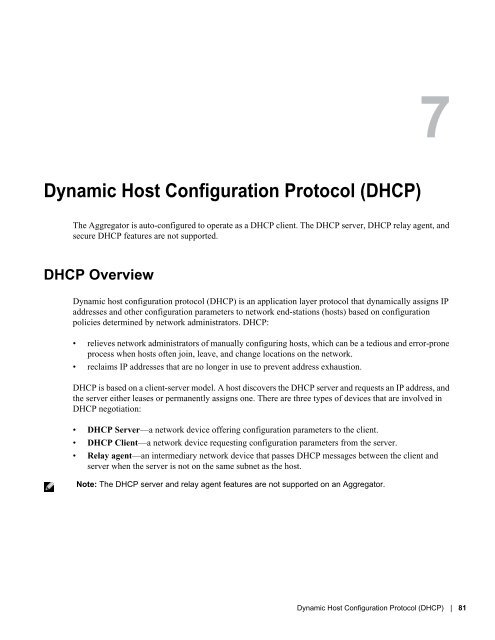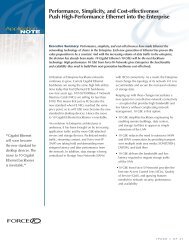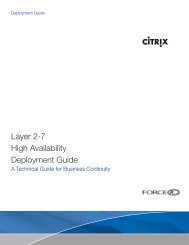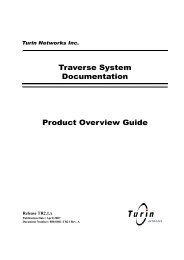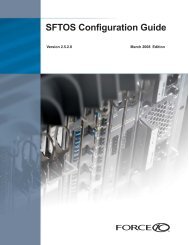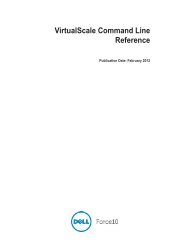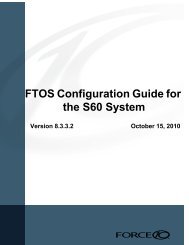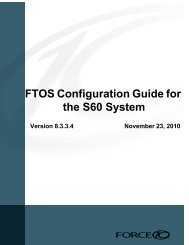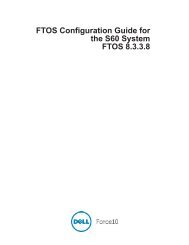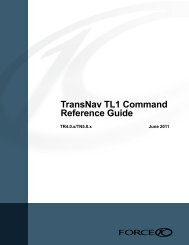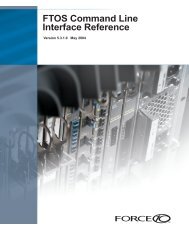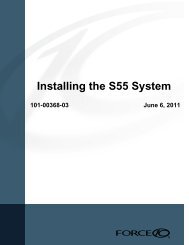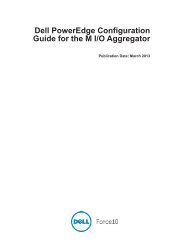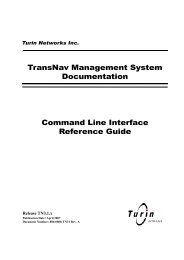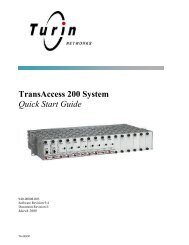- Page 1 and 2:
Dell PowerEdge Configuration Guide
- Page 3 and 4:
October 2012 | iii
- Page 5 and 6:
1 About this Guide . . . . . . . .
- Page 7 and 8:
Data Center Bridging Exchange Proto
- Page 9 and 10:
Displaying VLAN Membership . . . .
- Page 11 and 12:
Read Managed Object Values . . . .
- Page 13 and 14:
Troubleshooting Packet Loss . . . .
- Page 15 and 16:
About this Guide Objectives 1 This
- Page 17 and 18:
Before You Start Default Settings 2
- Page 19 and 20:
DCB Support DCB enhancements for da
- Page 21 and 22:
The untagged VLAN of a server-facin
- Page 23 and 24:
Configuration Fundamentals 3 The De
- Page 25 and 26:
Navigating CLI Modes The FTOS promp
- Page 27 and 28:
Figure 3-5. Undoing a command with
- Page 29 and 30:
Table 3-2. Short-Cut Keys and their
- Page 31 and 32:
Multiple Users in Configuration Mod
- Page 33 and 34:
Getting Started This chapter contai
- Page 35 and 36:
Uplink Ports Ports 33 to 56 are ext
- Page 37 and 38:
Step Task (continued) Note: Termina
- Page 39 and 40:
Figure 4-4. Completed Boot Process
- Page 41 and 42:
Figure 4-6. Completed Boot Process
- Page 43 and 44: Access the Aggregator Remotely Conf
- Page 45 and 46: Dell Force10 recommends using the e
- Page 47 and 48: Figure 4-10 shows an example of usi
- Page 49 and 50: To view the contents of a file, fol
- Page 51 and 52: Figure 4-14. Alternative Storage Lo
- Page 53 and 54: Aggregator Management This chapter
- Page 55 and 56: Changing System Logging Settings Yo
- Page 57 and 58: Configuring a UNIX Logging Facility
- Page 59 and 60: Enabling the FTP Server To enable t
- Page 61 and 62: Recovering from a Forgotten Passwor
- Page 63 and 64: Figure 5-5. Recovering from a Faile
- Page 65 and 66: Data Center Bridging (DCB) 6 On an
- Page 67 and 68: Figure 6-1. Priority-Based Flow Con
- Page 69 and 70: Data Center Bridging Exchange Proto
- Page 71 and 72: QoS dot1p Traffic Classification an
- Page 73 and 74: How Enhanced Transmission Selection
- Page 75 and 76: DCB Policies in a Switch Stack A DC
- Page 77 and 78: Note: On a DCBX port, application p
- Page 79 and 80: Auto-Detection of the DCBX Version
- Page 81 and 82: DCBX Error Messages An error in DCB
- Page 83 and 84: Figure 6-7. show interfaces pfc sum
- Page 85 and 86: Table 6-3. show interface pfc summa
- Page 87 and 88: Table 6-4. show interface ets detai
- Page 89 and 90: Figure 6-12. show interface dcbx de
- Page 91 and 92: Example: PFC and ETS Operation This
- Page 93: Table 6-8. Example: priority group-
- Page 97 and 98: Assigning an IP Address Using DHCP
- Page 99 and 100: Releasing and Renewing DHCP-based I
- Page 101 and 102: Figure 7-5. DHCP Client: Debug Mess
- Page 103 and 104: DHCP Client on a Management Interfa
- Page 105 and 106: FIP Snooping 8 FIP snooping is auto
- Page 107 and 108: Figure 8-1. FIP discovery and login
- Page 109 and 110: The following sections describe how
- Page 111 and 112: FIP Snooping Prerequisites On an Ag
- Page 113 and 114: Figure 8-3. show fip-snooping sessi
- Page 115 and 116: Figure 8-7. show fip-snooping stati
- Page 117 and 118: Table 8-5. show fip-snooping statis
- Page 119 and 120: FIP Snooping Example Figure 8-11 sh
- Page 121 and 122: Internet Group Management Protocol
- Page 123 and 124: IGMP Version 3 Conceptually, IGMP v
- Page 125 and 126: Leaving and Staying in Groups Figur
- Page 127 and 128: Figure 9-6. show ip igmp groups Com
- Page 129 and 130: Interfaces 10 This chapter describe
- Page 131 and 132: Viewing Interface Information You c
- Page 133 and 134: Disabling and Re-enabling a Physica
- Page 135 and 136: The Aggregator supports the managem
- Page 137 and 138: Configuring a Static Route for a Ma
- Page 139 and 140: Port-Based VLANs Port-based VLANs a
- Page 141 and 142: Displaying VLAN Membership To view
- Page 143 and 144: Adding an Interface to an Untagged
- Page 145 and 146:
Port channels can contain a mix of
- Page 147 and 148:
Figure 10-12. show interface port-c
- Page 149 and 150:
Create a Multiple-Range Figure 10-1
- Page 151 and 152:
Maintenance Using TDR The time doma
- Page 153 and 154:
MTU Size The Aggregator auto-config
- Page 155 and 156:
Figure 10-19. show interfaces statu
- Page 157 and 158:
Figure 10-21 shows the auto-negotia
- Page 159 and 160:
Clearing Interface Counters The cou
- Page 161 and 162:
iSCSI Optimization 11 An Aggregator
- Page 163 and 164:
If no iSCSI traffic is detected for
- Page 165 and 166:
Displaying iSCSI Optimization Infor
- Page 167 and 168:
Link Aggregation The Aggregator aut
- Page 169 and 170:
LACP Example Figure 12-1 shows an e
- Page 171 and 172:
Figure 12-3. show lacp 128 Command
- Page 173 and 174:
Figure 12-5. show interfaces port-c
- Page 175 and 176:
Layer 2 The Aggregator supports CLI
- Page 177 and 178:
Figure 13-1. Redundant NICs with NI
- Page 179 and 180:
Link Layer Discovery Protocol (LLDP
- Page 181 and 182:
Organizationally Specific TLVs Orga
- Page 183 and 184:
TIA Organizationally Specific TLVs
- Page 185 and 186:
LLDP-MED Network Policies TLV A net
- Page 187 and 188:
LLDP Operation On an Aggregator, LL
- Page 189 and 190:
Figure 14-10. Viewing All Informati
- Page 191 and 192:
Debugging LLDP The debug lldp comma
- Page 193 and 194:
Table 14-8. LLDP System MIB Objects
- Page 195 and 196:
Table 14-10. LLDP-MED System MIB Ob
- Page 197 and 198:
Port Monitoring 15 The Aggregator s
- Page 199 and 200:
Figure 15-2 shows ports 0/25 and 0/
- Page 201 and 202:
In Figure 15-4, the host and server
- Page 203 and 204:
16 Simple Network Management Protoc
- Page 205 and 206:
Dell Force10 supports RFC 4001, Tex
- Page 207 and 208:
Figure 16-6 shows the output for an
- Page 209 and 210:
Use dot3aCurAggFdbTable to fetch th
- Page 211 and 212:
Monitor Port-channels To check the
- Page 213 and 214:
The status of the MIBS is as follow
- Page 215 and 216:
Stacking Overview 17 An Aggregator
- Page 217 and 218:
Stack Master Election The stack ele
- Page 219 and 220:
Stacking Port Numbers By default, e
- Page 221 and 222:
Cabling Procedure The following cab
- Page 223 and 224:
Resetting a Unit on a Stack Use the
- Page 225 and 226:
Figure 17-19. show system Command E
- Page 227 and 228:
Troubleshooting a Switch Stack Trou
- Page 229 and 230:
Figure 17-27. show hardware stack-u
- Page 231 and 232:
Stack Unit in Card-Problem State Du
- Page 233 and 234:
Upgrading a Single Stack Unit Upgra
- Page 235 and 236:
Broadcast Storm Control 18 On the A
- Page 237 and 238:
System Time and Date 19 The Aggrega
- Page 239 and 240:
Setting the Time Zone Universal tim
- Page 241 and 242:
Setting Recurring Daylight Saving T
- Page 243 and 244:
Uplink Failure Detection (UFD) Upli
- Page 245 and 246:
Figure 20-2. Uplink Failure Detecti
- Page 247 and 248:
Show Command Syntax Description sho
- Page 249 and 250:
Debugging UFD on an Interface To en
- Page 251 and 252:
Upgrade Procedures 21 To view the r
- Page 253 and 254:
Debugging and Diagnostics The chapt
- Page 255 and 256:
Broadcast, unknown multicast, and D
- Page 257 and 258:
Auto-configured VLANs do not exist
- Page 259 and 260:
Figure 22-2. show system stack-unit
- Page 261 and 262:
Figure 22-3. Taking a Stack Unit Of
- Page 263 and 264:
Table 22-2. show hardware Commands
- Page 265 and 266:
Recognize an Over-Temperature Condi
- Page 267 and 268:
The simple network management proto
- Page 269 and 270:
Deciding to Tune Buffers Dell Force
- Page 271 and 272:
Figure 22-11. Displaying Buffer Pro
- Page 273 and 274:
Sample Buffer Profile Configuration
- Page 275 and 276:
Figure 22-14. Displaying Buffer Sta
- Page 277 and 278:
Displaying Stack Port Statistics Th
- Page 279 and 280:
Figure 22-19. Mini application core
- Page 281 and 282:
Standards Compliance This chapter c
- Page 283 and 284:
General IPv4 Protocols RFC# Full Na
- Page 285 and 286:
Network Management (continued) RFC#


